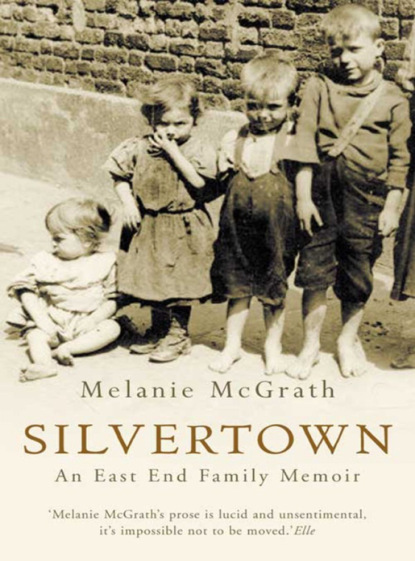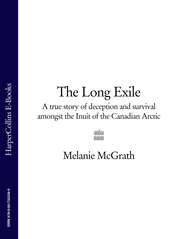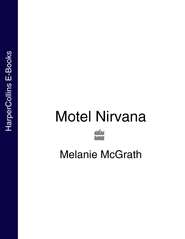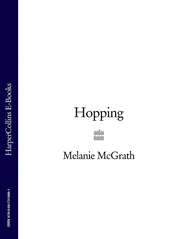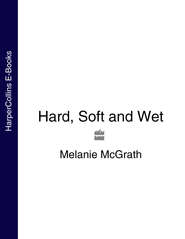По всем вопросам обращайтесь на: info@litportal.ru
(©) 2003-2024.
✖
Silvertown: An East End family memoir
Настройки чтения
Размер шрифта
Высота строк
Поля
It would be comforting to imagine Len Page playing along the reedy streams and among the bean fields, or hunting pheasants in the woods, wood pigeons in the fields, perch in Ingrebourne River and rabbits everywhere, the sky stretched over him as soft as a petal, his lungs filled with damp air. But the fact of the matter is he probably spent much of his early life wading through mud. There was a great deal of that in the lowlands. From November to March there was little else but wind and mud and spells of bitter cold when the roads turned to brown ice.
The name Page conjures images of books and education, but the Pages had none of either. They were illiterate agricultural labourers who worked the land at Emery’s Farm in North Upminster. Len’s father, Jim, was a stern and silent man who passed his days among the dumb rows of cabbages. He was happier alone with his plough horses – Suffolk Punches and Percherons – than he was around people. He had no appetite for idle chatter or gossip and preferred to listen to what the breeze had to say. He was fond enough of his wife, Emily Nottage, but she didn’t really interest him. After their marriage in 1895 he discovered that a woman’s world was convoluted and women themselves hard to please, so he stopped trying. His children did not rouse him either. He and Emily had four: Thomas, Leonard, and twins Emily Maria (known as Ria) and Daisy. As a matter of duty he provided for them, but since he didn’t own a farm to pass on to them they were incidentals in his life. It wasn’t that he disliked them, just that he preferred his Percherons.
The Nottages were labourers, too. They worked at Blush Farm in Chafford Heath and at Hawthorn Farm in Upminster. Emily’s father, Thomas Nottage, was as much a loner as her husband, and his wife, Jane, Emily’s mother, had learned to put up with it. Thomas and Jane had six children: Alfred, William, Thomas, Emily, Walter and Fred. As soon as they were old enough to pick up a shovel, the boys joined their father labouring, leaving Jane and Emily responsible for the endless domestic chores as well as the kitchen garden and the chickens.
Things were not easy for the Nottage family. They moved around a great deal, Thomas never staying at one farm for more than a few years and the whole family having to up sticks and trundle their belongings to the next place. The children, Emily included, grew up to be independent-minded and with a sense of the impermanence of things.
By all accounts, my great grandmother Emily made a disgruntled countrywoman. She chafed against the solitude and routine. Country life held no mystique for Emily. In her view, clouds were no more interesting than buckets of water and fields of wheat were simply unmade bread. Emily longed for the glamour of the town. She complained that there was nothing to do in Corbets Tey but work. He restlessness rubbed the family raw. Whenever she could she would dress in her best and take herself off to Romford Market. The market had been the social and trade hub of southern Essex since at least the mid-thirteenth century. Farmers from all over the area gathered at The Blucher’s Head in the market square to discuss the weather and the current state of their crops. On summer evenings men and women danced jigs together in the square. On May Day they ran around the May Pole, and that may well be how Jim and Emily first met.
On the opposite side of the square from The Blucher’s Head stood The Windmill and Bells. The Windmill was rather downmarket, its clientele the poachers and the labourers who worked for the farmers. At The Windmill they would trade news of labouring opportunities and ferrets. Jim Page bought and sold his ferrets here and picked up poaching tips. Jim was a keen poacher and a generous teacher. As soon as they were old enough he taught his sons the art of setting traps and snares and hunting with dogs and ferrets, and from the age of ten or so the boys spent much of their spare time snaring rabbits and netting birds on the riverine marshes at Rainham, Wennington, Hornchurch and Aveley, or fishing for perch in Rainham Creek. It was illegal but the marshes were never much of a target for the law. Thomas and Len grew up with a poacher’s contempt for authority and a sense too that a world of plenty existed outside the confines of their current circumstance and they had a right to go out and get their share.
They were desperately poor. In 1914 an agricultural labourer’s pay of thirteen shillings a week was not enough to buy food for a large family, and when the weather was bad Jim took home as little as half that sum. They were always insecure. If a labouring man got caught under the thresher and smashed his leg, or the crop failed or the farmer bought a tractor, the labourer’s family would be turned out of its tied cottage and left to fend for itself.
In 1914 the Agricultural and Rural Workers Union began organising strikes all over East Anglia, calling for a stable wage and more security of employ. The strikes went on for months and became bitter. Disgruntled labourers began burning fields and cutting cattle loose. George Lansbury, the socialist MP for Poplar, travelled to Essex in the hope of encouraging the strikers to carry on, but these were tiny, rural communities and the strikes split them down the middle. It was then that Jim Page finally made up his mind to leave. However much he loved the country, life there had become too hard and he was in no doubt that the tractor and threshing machine, the new American grain ships he’d heard talk of and the growth of trade from the colonies were going to make it harder for labourers like himself. He decided to pack up the family and put them on the train to London. It was only thirty miles to the west but it might as well have been thirty thousand.
In my family, East is where you start out and West is where you hope to end your days. For us, East has never been the east of the sunrise, of Eden or of new beginnings. East is nowhere glamorous or elemental or softly perfumed. The East we know is the east of the Anglian Marshes and the east of the East End of London. East is grimy city terraces in fog-plagued streets. East is biting winds and soggy ground and a dying livelihood.
A wagon pulled by a Percheron takes the Page family from their flinty home in Green Lane to the train station at Upminster. Their few things – a couple of blankets, sheets, a rabbit fur cover and the bits and bobs of Emily’s trousseau – are slung in the back between hay bales. As they round Cabbage Corner, Jim inspects the familiar, loved terrain, his face dimming with tears, while Emily smiles ahead and the children play catch-what-can in the back. At the station they unpack the bags, pat the Percheron goodbye and stand on the platform watching the empty space along the track until, finally, when their eyes are growing sore from looking, the first intimations of smoke come into view, followed by the maroon carriages and the great green-panelled engine of the train itself.
Oh look Da, says Len Page, only eleven then, and curious. It’s got ‘Upminster’ painted on the side. That’s the name of the train, ain’t it?
Machines ain’t given names. Jim shakes his head at his son’s foolishness. Only livin’ things are given names. So that can’t be the name thar, see? That’s only where it’s from.
Then the cloud of smoke rises, obscuring, for an instant, the family standing on the platform edge, and they heave their bags into the carriage and take their places on the hard wooden seats and the train begins to haul itself slowly westwards towards Upminster and Romford and on to London. From the seat beside the window Len Page watches the landscape of his childhood receding behind them. Then, feeling exploratory, he gets up and takes himself off along the aisle to the next carriage, where a fat man with a goitre is sitting reading a newspaper. He edges along the aisle and for a moment the combined swaying of the train and smell of coal smoke overtakes him and he does not notice a man in uniform bowling along the aisle towards him.
You going somewhere, son?
No, he says.
Well get back to your seat, then, sonny boy.
He follows Len to the carriage door.
Hey mister, says Len, remembering the conversation with his father, what’s this engine called?
This? The man in the uniform smiles. This is the Upminster, son. The number twenty-one.
Thank you mister.
The man in uniform ruffles Len’s dun brown hair.
You interested in trains, sonny?
No.
Ah, says the man, darkening. You get back to your place then.
Sliding on to the wooden bench, Len tries not to catch his father’s eye. He is glad when the Upminster begins to draw into Fenchurch Street on the eastern side of the City of London and with its brakes squealing and the smoke pouring from its funnel finally slows to a halt in the wide iron arms of the station.
The journey from Upminster to London takes just under an hour but this is the first time that Jim Page or Emily Nottage or their children have ever made it. They hire a hackney carriage to take them east from Fenchurch Street. ‘As far as I could see were the solid walls of brick, the slimy pavements and the screaming streets,’ Jack London wrote in 1904, and the scene isn’t so different ten years later. The carriage takes them through the sullen alleyways and lanes of Aldgate and Whitechapel and out to the market stalls at the Mile End Waste which dot the road as far as the eye can see like a set of ragged flags. On either side there are more people than they have ever imagined could live in one place, even such a place as London.
The Thames pushes east towards the sea, but the city’s wealth has for centuries drifted westwards, against the direction of the prevailing winds, to escape what Sir William Petty described four hundred years ago as the ‘fumes, steams and stinks of the whole easterly pile’. The booty of the docks flowed west too, along the wide East London arterials – Mile End Road, East India Dock Road, Commercial Road, West India Dock Road, Roman Road, Royal Victoria Dock Road – to more prosperous parts of London where people lived luckier lives.
You move to the East End if you are desperate, and the Pages are. There is unskilled work to be had in the factories, in the finishing trades and around the docks, and a man with strong hands and an eager face can just about scrape by and, more to the point, feel that he is among those who understand as well as he does the predicaments of exile. Over the centuries, all Europe’s diasporas have met here: first Huguenots, men and women like the Fulchers, then Jews fleeing Russian pogroms, Irish on the lam from the potato famine, and after them Armenians, Lithuanians, Poles, more Jews and other refugees from religious persecutions, and finally families like the Pages, the English rural poor. A hundred years on it is the same, though the mix has changed. Wander through any of the East End’s markets on a sunny afternoon and you will pass by Somalis, Polynesians, Vietnamese, Cambodians, Liberians, Eritreans, Indonesians, East African Asians; most of whom are there because they were obliged to leave somewhere else. The Pages are just one point on a continuum stretching across the centuries.
So they settle in East Ham, which is then a small suburb of ‘respectable’ working class homes beside the fastest-growing, poorest, most overcrowded and most heavily industrialised area in London. Emily has family in East Ham and for a while they are able to rent a room from them; six people, taking turns on the bed and with the sounds of another family leaking through the walls. Things are not as bad as they might be. Jim soon finds work as a labourer in a lumber yard and before many months have passed, they have a little money. Emily likes not having to travel to market. There are stalls and shops on every street corner. Jim takes comfort in small things. On his way to work every morning, he passes fields. Occasionally cows wander along their modest, tree-lined street and once in a while, if he closes his eyes, he can almost imagine he is back in Corbets Tey.
CHAPTER 3 (#ulink_0cd35345-89fb-5e9c-8ff2-cc61036c8268)
In the years before the first war, the Fulcher family concerns are the concerns of respectability – nits, bedbugs and the price of marg. They’re not on the rise, exactly, but they’re not on the fall either, and there is a pleasing steadiness to life. Frenchie is bringing home most of his carpenter’s wage and Sarah is able to top it up with the few shillings she makes from taking in the mending for James Looke’s laundry in Ullin Street. Not so far away, not so far at all, there are families whose children go about barefoot and shit in pits in the cellar; families whose lives are reduced to a matter of other people’s pockets and what might be in them; families who might go under altogether if it weren’t for Sally Army soup. Not the Fulchers. The Fulchers all have boots (with cardboard soles fitted periodically by Frenchie), and each is in possession of his or her own outer garment. The Fulcher children only have nits when they catch them from other children, and there is bread and marg at every mealtime. No Fulcher child has ever had to dip for a living, and not a drop of Sally Army soup has passed Fulcher lips.
Not all the families in Ullin Street are so lucky. Among these are the Jorrocks who live at number twelve. Matty and Tom Jorrocks have to collect the horse shit off the roads to sell to the families with vegetable plots, and their mother Mary has been seen standing in the soup kitchen queue. Matty and Tom have boots, though they are taken from different pairs and Matty’s toes explode from his. Between them they share a ragged twill which they take it in turns to wear, Matty every morning on the way school and Tom on the way back. Their destinies are already set. At the age of fourteen they will leave school and if they are lucky they’ll find work in the docks, the factories or the sweatshops. Others will take their emptied places and so it will go on.
All the children of school age living in Ullin Street are obliged to attend the same school, just a few roads away in Bright Street. The Bright Street School is a hulking, optimistic construction of red brick sandwiched between a terrace of houses and a forest of pubs, within whose damp walls the children of East Poplar are daily expected, by some mysterious means, to obtain an education.
Mathematics: three times six is eighteen.
Religion: the Seven Deadly Sins: greed, lust, gluttony, covetousness, etc.
History: the Tudor monarchs: Haitch, He and Me. That’s Henry VII, Henry VIII, Edward V, Mary I and Elizabeth I.
Politics: the sun never sets on the British Empire.
At eight o’clock every morning the doors of Ullin Street open and the children tumble out and make their way towards Bright Street. It is no more than a five-minute walk but for the Fulcher children it is the longest five minutes of their day because Matty and Tom Jorrocks have made it their young lives’ work to torment the Fulchers. The only Fulcher Tom and Matty never tease is Rosie and that is because Rosie is thirteen and pretty.
Plain Jane. Plain Janey Foolshit, shout Matty and Tom at the gaggle of miserable Fulchers. Mouldy Maudie Foolshit, Johnny Pongy Bastard-Foolshit.
Sometimes a stone will soar into the air and land thump on the back of one of the Fulcher children. Once, a dead rat comes at them. Another time a clump of horse shit. Banned by Sarah from talking to the Jorrocks, the Fulcher children have little choice but to carry on along Ullin Street, but nothing seems to discourage Tom and Matty.
Foolshit. Plainey Janey.
Mum, why do they call us names? asks Jane.
Because they’re common.
Why? says Jane.
Her mother smiles at her girl and winks and shakes her head.
Blimey, the questions you ask! C’m ’ere and drink your tea.
Jane is an average student in every lesson with the exception of writing. Twice a day a single slate comes around the class and the children are expected to inscribe on to it whatever the teacher demands. However hard Jane toils over the slate, her right hand will not write. The left produces perfect scrolls, beautiful lines and slashes but the right is like a wayward child. Very often she can get nothing from it but squiggles and odd little polka dots.
Only witches and imbeciles write with their left hands, Jane Fulcher, says Miss Whiting, the teacher. Which are you? Now, right hand, please. What are you waiting for?
I can’t do it, Miss.
A long sigh, eyes raising to the roof. How old are you, Jane?





